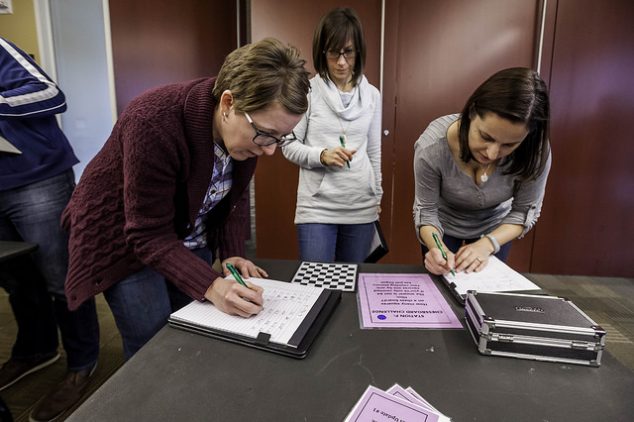If you are thinking about completing a maths PhD then you will probably have lots of questions. Which topic should you study and at which university? How do you apply and by when? Most applicants are also wondering how they will fund their maths PhD, with access to funding being a major factor in their decision making.
As well as studying for PhDs in pure or applied mathematics, there are many maths graduates who go on to study for a PhD in an area outside of mathematics. Many choose to complete interdisciplinary PhDs which build on their mathematical skills in an area such as mathematical biology. It is important to first consider what you want to study as this will then have an impact on how it is funded.
The good news is that doing a PhD could have a number of benefits:
- Study the subject you love for three or four more years
- Gain valuable skills
- Become more employable
- Allow you to access a future career in academia
- Allow you to specialise in a subject different from your undergraduate maths degree
What will I need funding for?
You will need funding to cover both your course fees and also your living costs. The upside is that course fees are typically lower than for undergraduate degrees, usually between £3000 and £6000 for home students.
You will also need to cover living costs, including accommodation, food, travel, supplies for your course and other general living costs. This could come to around £9000 – £14,000 per year in the UK. With tuition fees included this all adds up to a ballpark figure of £12,000-£20,000 needed per year. Costs can vary a lot depending on your lifestyle and where you study – this is why it is imperative that you put together an individual budget based on your own personal circumstances. This will need to be maintained for three or four years.
How can I obtain funding for a Maths PhD?
There are many different options when it comes to funding. Some scholarships and awards have deadlines for applying so it is important to check these as soon as possible so that you don’t miss out. Arrangements vary from country to country, so this article concentrates on the UK.
- Scholarships or awards from universities
Most universities have their own PhD scholarships or awards, specific to their own institution. They may be general awards of money or they may be aimed at certain types of students or students on particular courses. Check the web pages of individual institutions.
- Awards from Research Councils
Research Councils award funding for doctoral training, usually in the form of PhD studentships. These PhD studentships are usually advertised by individual universities rather than by the Research Councils. A good starting point would be to look at the web pages of individual maths departments where you think you might like to study. Some PhD studentships will be tied to an individual topic and supervisor, whereas others may be more general.
The EPSRC (Engineering and Physical Sciences Research Council) also funds a number of Centres for Doctoral Training (CDTs) and Doctoral Training Partnerships (DTPs). Search for both of these terms on the EPSRC website in order to find out more. Many of the CDTs depend on obtaining part of their funding from external partners, so they may propose projects associated with an external partner. Alternatively, if you come with your own ideas about a project with an external partner and a reason the partner might be willing to contribute, then you may be more attractive.
If you are a current undergraduate then speak to your course tutor or a lecturer who specialises in your area of research interest. Hopefully they can give you advice on funding opportunities or refer you to someone who does. For example they may have heard about a PhD studentship which is being advertised in their area but at a different university.
- CASE Awards
Industrial Cooperative Awards in Science & Technology (CASE) are PhD studentships where businesses work alongside a university. This type of studentship will be advertised via individual universities, however you can find out a general overview on the EPSRC website.
- PhD Loans
The government offers Doctoral Loans of up to a total of £25,000. This amount won’t cover the full fees and living costs of a PhD, however it will certainly be of interest to many students who have not been able to obtain a PhD studentship.
- Part time work
Studying for a maths PhD can be intense, therefore it is worth being cautious about taking on too much extra work. On the other hand, many universities pay their PhD students to do some undergraduate teaching. Some PhD funding comes with the requirement that you do some teaching or tutoring for the university. This type of work can fit in better with your PhD and can also help you develop important skills.
Many universities also advertise residential tutor positions where you live as a warden inside a halls of residence in exchange for a reduced or zero rent. This position is not for everyone, but it could help you achieve vastly reduced living costs.

You might be able to take on more work if you complete a part-time PhD which will take you five to seven years to complete. Completing a PhD part-time can however be very demanding. This type of study will work for some people and is particularly favoured by mature students or people who are established in a career.
Alternative methods of support
Some maths PhD students are able to draw on family support or support from their partner while studying for their maths PhD. If you are able to live at home or have your living costs supported then there is a possibility that some students can cover the fees of £3000-£6000 through savings or part-time work. Again this option is not for everyone but for some people it is certainly worth thinking about.
Get ahead of the crowd
You are going to give yourself the best chance of securing PhD funding if your CV and academic record stands out from the crowd. This could mean academic achievements such as winning an undergraduate prize, or achieving a high overall percentage in your exams. However it could also include teaching experience – if you have been paid by the university to supervise first-year students it could demonstrate an aptitude for teaching which could be useful during your PhD.
Your research experience could also help you stand out – did you complete a particularly interesting final year project, or perhaps you won an undergraduate research bursary? You may also have completed a summer internship at a company. There could be other experiences which demonstrate your passion for maths such as being a student member of a professional body or an exec member of your university maths society. This list is not exclusive – but hopefully it will help you think about how you can give yourself the best chance possible of being selected for funding.
Start your research now
The main message is to be proactive and start your research into funding options as early as possible – there is not one set path which everybody takes. Therefore you should speak to as many people as possible, which could include your personal tutor; careers advisors; current PhD students at your university and family and friends.
Joining a Professional Body during your PhD
Most professionals belong to what is known as a Professional Body. For example doctors might be a member of the British Medical Association and solicitors might join the Law Society.
As a mathematician completing a PhD you are able to join the Institute of Mathematics and its Applications (IMA) as an Associate Member, which is at a reduced student rate of only £10 per year.
The IMA as a professional body does not fund PhD studentships. However, if you join as an Associate Member you will improve your CV, receive the IMA’s magazine Mathematics Today and be able to network with other mathematicians working in industry, commerce, schools and universities.
Once you finish your maths PhD you might be able to work towards becoming what is known as a Chartered Mathematician. This will help any employer recognise your mathematical skills and will be great for your career. Many university mathematics lecturers and professors, as well as experienced professionals in industry become Fellows of the IMA.
Piggy Bank via ccpixs.com
Study Group at UBC Library by UBC Library Communications @ Flickr
College of DuPage STEM Professional Development Workshop Teaches the Art of Escape Games 2017 44 by COD Newsroom @ Flickr
Article by Hazel Lewis







